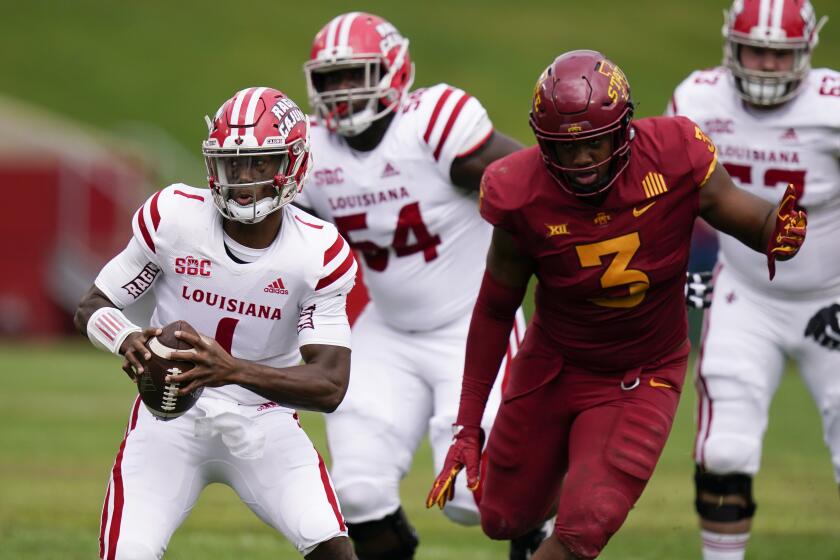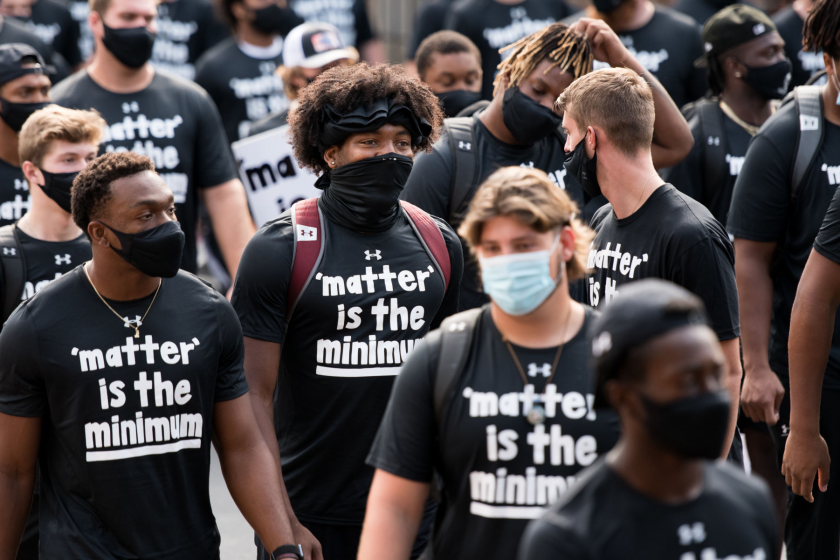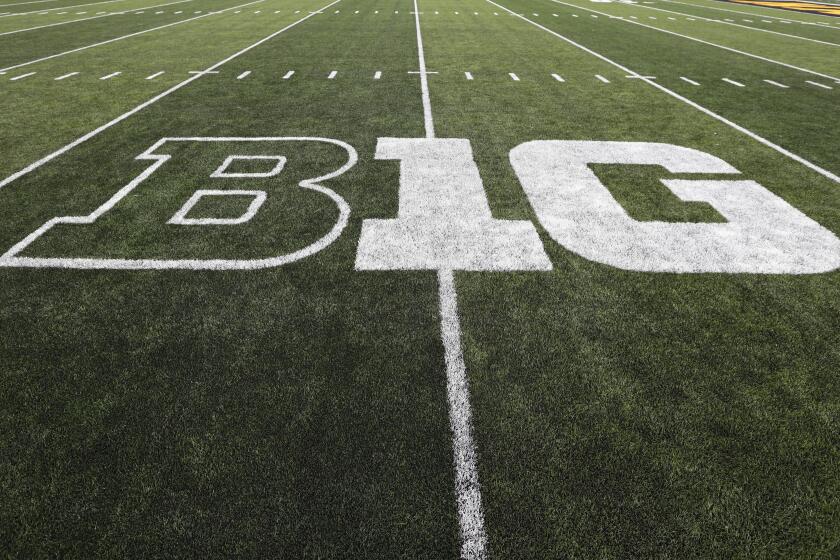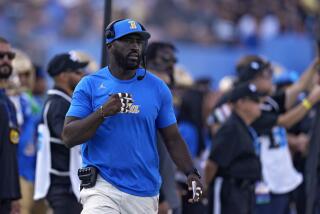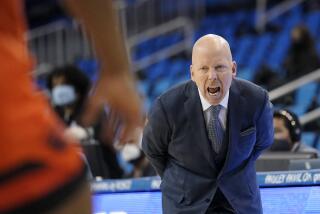‘Depressing and devastating’: L.A. alumni clubs grapple with quiet football Saturday
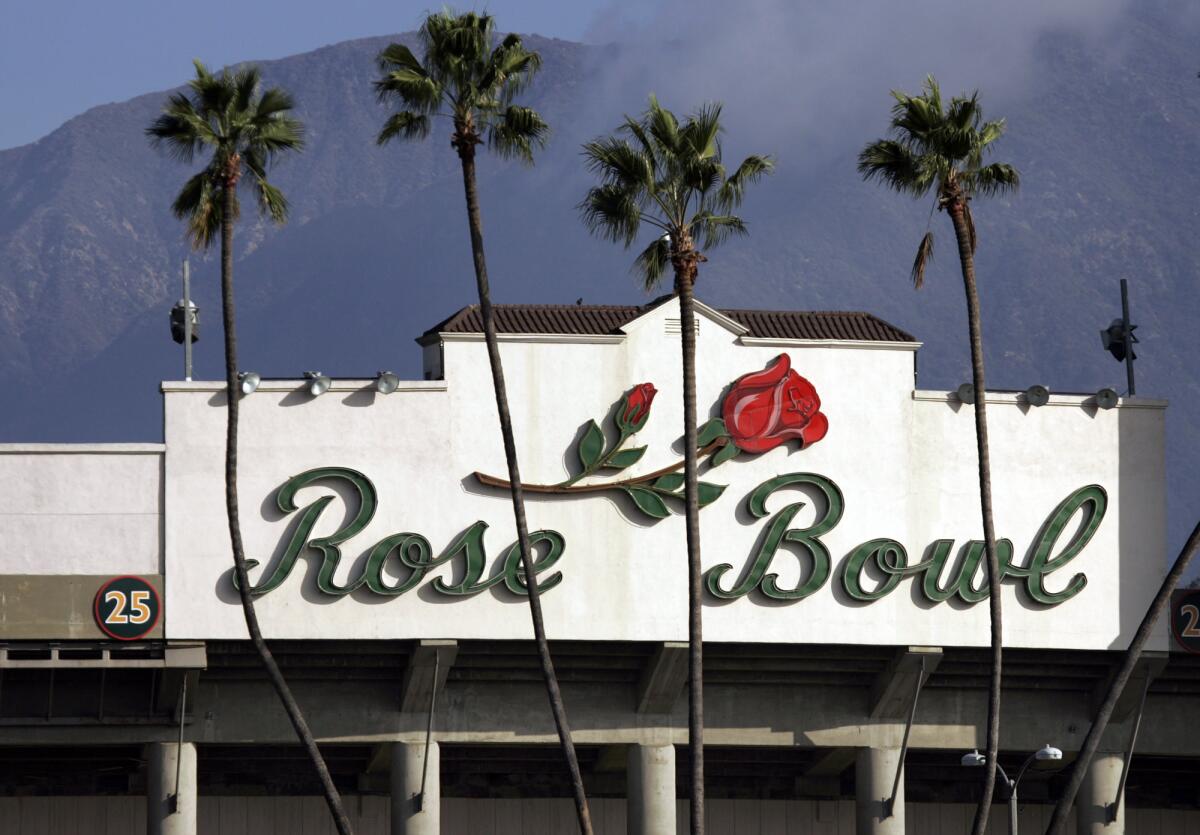
- Share via
The Coliseum sat empty. The Rose Bowl too, with smoky, unbreathable air from California’s rash of wildfires looming above. The silencing of those beloved bastions by the COVID-19 pandemic was strikingly sad, but the morose mood of this September Saturday unlike any other could be felt all over Southern California.
There were no Big Ten alumni clubs slipping into their chosen Westside outposts for that early 9 a.m. kickoff. No Bloody Marys or mimosas sipped in between high-fives and rousing renditions of a fight song. No joy, no heartbreak to share with one of your own before returning to that often overwhelming Los Angeles life all transplants have chosen to take on.
You wouldn’t know it by reputation, but L.A. can be a fun college football town, especially if you follow the national scene. Every fan base has real representation here, and that fandom, that connection to one’s pre-L.A. life, can mean more in a city so bulging and spread out it is hard to detect a sense of true community.
Louisiana-Lafayette pulled off one of its biggest wins in program history with a 31-14 upset over No. 23 Iowa State.
“At the end of the day, you want to be around like-minded people, people you have something in common with,” said Maurice Hall, a running back on Ohio State’s 2002 national championship team who moved here to pursue an acting career and became the president of the Ohio State Alumni Club of Los Angeles. “It gave me that outlet outside of the entertainment industry to make me feel at home. It’s good to reminisce, and when you go to watch a game, you know everyone has that one thing in common.”
Saturday night was supposed to be a huge party with No. 2 Ohio State visiting No. 9 Oregon. That would have meant dozens of rowdy “Bucknuts” at Sycamore Tavern in Hollywood and a slightly more peaceful group of Ducks fans at Busby’s West in Santa Monica.
“It’s depressing and devastating, because all of us are transplants here from the Midwest, and not to have this as a social outlet every Saturday … we’re all suffering from pandemic fatigue,” said Bob Banta, an Ohio State alum who moved to L.A. in 1966 and was one-time president of the Big Ten Club.
“The Big Ten Club was founded to network and develop the power of the Big Ten universities joining together, the transplants out here, to compete with the network that USC had built in their alumni association. It was business networking, but from there, it fostered into great camaraderie. As much as the rivalry exists between Ohio State and Michigan, some of my best friends graduated from Michigan.”
Yes, on this day, even Michigan and Ohio State could agree on something. Once upon a time, Saturday would have been the Wolverines’ home opener in the Big House after having played at Washington last weekend.
“I feel like I’ve been able to keep the fact that the Big Ten is not playing out of sight, out of mind, until this weekend,” said Greg Maczka, a Michigan grad who organizes a weekly Wolverines game watch at Q’s Billiard Club in West L.A. “Today I turned on that Kansas State game, and it was crazy to see, they have fans in the stands, and it’s a little bit jarring because most other sports don’t have fans right now. It’s certainly some FOMO (fear of missing out).
“It feels particularly weird with other leagues playing, and even high schools playing. At least previously the entire world was shut down and we were all in it together. The bizarre thing for Pac-12 and Big Ten fans is that we don’t have something that almost everybody else does.”
The fight for racial equality and the ongoing COVID-19 pandemic are more important this college football season than the games being played.
Saturday marked the first day of Power Five games played with COVID-19 protocols. There were no marquee matchups like Ohio State-Oregon or Texas-Louisiana State, as originally planned, and only limited capacity attendance allowed, but the games were as wild as ever.
Two Sun Belt Conference teams showed why in that part of the country it’s known as the “Fun Belt.” Arkansas State upset Kansas State 35-31, moments after Louisiana smacked around Iowa State 31-14. The Big 12 must regret having allowed members to play one nonconference game, but it was fun for everyone else.
After that chaos was complete, the biggest news of the day emerged from the Big Ten. A report from Yahoo! Sports said the Big Ten’s return to play task force had convinced a group of league presidents to have another vote about the fall season, which could come as early as Sunday. New information was presented about rapid testing and myocarditis, the heart inflammation caused by COVID-19.
“I don’t know if this is blind optimism or what,” Maczka said, “but I feel like the Big Ten is going to play.”
Big Ten presidents will meet Sunday to hear a presentation on playing a football season — maybe as soon as October — but a vote isn’t guaranteed.
For now, only certain alumni clubs have a decision to make about whether to stage outdoor watch parties that fall under county and city regulations.
The Oklahoma Club of Greater Los Angeles didn’t meet for Saturday’s pay-per-view game against Missouri State, but did elect to meet for the Sooners’ conference games at Busby’s West.
“We’ll have masks, and we’ll sit at tables outside with the group you came with,” said Kelsey Hightower, the club president. “Typically we have people including myself running through the bar, chanting ‘Boomer Sooner!’ [Or] going to visit other tables, interacting with new faces, now you kind of have to be at your table. It won’t have all the jumping around, college excitement feel to it.”
Hightower has heard from a lot of OU grads who still want to get together. Football is such a huge part of their university’s culture, and there’s a level of passion for the Sooners that the average L.A. native can’t quite understand.
“Moving from Oklahoma, it’s definitely a culture shock,” said Hightower, who moved here eight years ago. “You need a group you can get along with, a shared experience with other people, to make it more like family. It was something I got involved with early on and helped me to stay out here, I think.”
And what of Oklahoma’s archrival, Texas?
Fittingly, the Texas Exes Los Angeles Chapter has decided not to meet in-person for games this fall.
On Saturday night, as the Longhorns opened against Texas-El Paso, the chapter hosted a Zoom game watch, inviting attendees to cook Lone Star favorites like barbecue, chili and chili con queso. It wasn’t quite like their usual gatherings at Cabo Cantina in West L.A., but the expectations stayed consistent on the event invitation:
“Come early, be loud, stay late, wear orange! Hook ’em Horns, y’all!”
More to Read
Go beyond the scoreboard
Get the latest on L.A.'s teams in the daily Sports Report newsletter.
You may occasionally receive promotional content from the Los Angeles Times.

